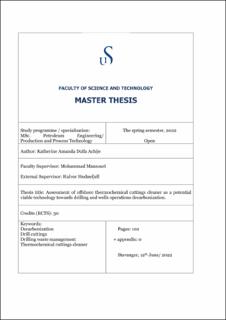| dc.description.abstract | The energy industry- particularly the oil and gas- is facing unprecedented times to supply global energy resources to drive economic progression and reduce greenhouse gas emissions to limit global warming. As alternative low carbon or greener energy resources are being developed and commercialised, it is important the transition is seamless. Effective energy management and adoption of sustainable low energy intensive technologies need make-up today’s solutions. Not only will it bridge us over to the future energy industry, but also play in securing today’s planet.
In this work, the offshore thermochemical cuttings cleaner (TCC) is assessed as a potential viable technology towards drilling and wells operations decarbonization. A multifaceted approach was adopted to determine prevailing environmental regulations, drilling waste management techniques, and understanding the as-is situation in Norway for treatment and disposal of oil-based mud cuttings. Exploring the technology from a sustainability framework was key to present an enlightened across the view findings and recommendations.
In light of Neptune Energy Norway data and findings presented in this master thesis, there exists a tangible 28% potential supply vessels fuel and eventual carbon dioxide emission reductions for supply vessels by adopting this offshore TCC technology. For yearly operations, there exists a strong potential for precisely field development drilling operations. Evidently presented, the technology has progressively improved, and simulated tests/studies demonstrates likened environmental impact on the aquatic ecosystem as from offshore discharge of water-based mud cuttings.
Further due diligence is recommended to undertake an in-depth tailored environmental risk assessment, especially for adoption of the offshore TCC technology on a mobile drilling rig. Attention is also required to finding alternative yellow chemicals to red chemicals currently in the oil-based mud. Undertaking a wholistic life cycle assessment covering the current onshore TCC treatment of oil-based mud cuttings reduce further concerns and increases confidence in potentially switching current operational procedures. | |
